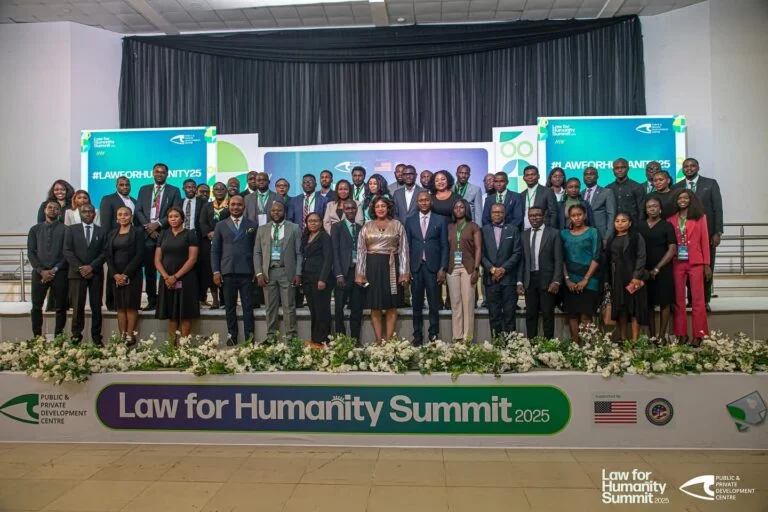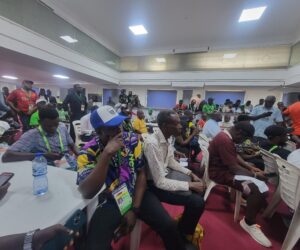By Ibironke Ariyo
Experts have called on Nigerian lawyers to uphold the highest professional standards while providing pro bono legal services to ensure effective access to justice for vulnerable citizens.
They spoke on Monday in Abuja at the 2025 law and humanity summit organised by Public and Private Development Centre (PPDC).
This, the experts said, is crucial for ensuring effective access to justice and bridging the significant justice gap in Nigeria.
In his keynote address, renowned legal scholar, Prof. Omoniyi Akinola, noted that professionalism in pro bono practice enhanced public trust in the legal system and reflects positively on the image of the legal profession as a whole.
Akinola pointed out that by maintaining high standards, lawyers not only fulfil their duty to promote justice but also demonstrate their commitment to the rule of law and human rights.
Akinola, who is a Professor of Law at Baze University, Abuja, advocated for the inclusion of pro bono service as one of the criteria for the appointment of judges and notaries.
This, he argued, would not only encourage a culture of selfless legal service but also ensure that those elevated to such positions have demonstrated a genuine commitment to justice and public interest.
“The essence of pro bono work is to ensure that justice is accessible to all, particularly those who cannot afford legal representation.
“This noble goal can only be achieved when lawyers maintain diligence, competence, and integrity in their service delivery,” he said.
Speaking on the theme, ‘The quintessential pro bono lawyer: Providing value without compromising professional standards’, Prof. Akinola highlighted the growing need for ethical legal aid in Nigeria’s justice sector.
Akinola, who is also a law clinician, explained that while pro bono work bridges the gap between the privileged and the underrepresented, it must be carried out with the same level of dedication and excellence as paid legal services.
“Every client deserves the same quality of representation, regardless of their financial status. Pro bono should never mean substandard,” he said.
The expert called for international collaboration, capacity building for law clinics, and better coordination of clinical activities.
He, however, highlighted the necessity of pro bono services for indigent individuals and commended the efforts of PPDC in promoting these initiatives.
In her remarks, the Chief Executive Officer, Public and Private Development Centre (PPDC), Ms Lucy Abagi, said that pro-bono legal services remained a critical pillar in ensuring equal access to justice.
Abagi, however, noted that justice must be accessible regardless of wealth, class or circumstance.
According to her, pro-bono work is not charity but justice freely rendered through professional excellence, where legal knowledge meets humanity’s needs.
She commended Police Duty Solicitors across police stations, describing their intervention as a “quiet revolution” improving documentation of arrests, respect for rights and accountability within law enforcement.
Abagi said that early legal intervention had protected suspects who would otherwise lacked representation, adding that respect for human rights must begin at the police station.
She also applauded university law clinics and student clinicians from the Ahmadu Bello University Zaria, University of Abuja, University of Jos, Nigerian Law School–Yola Campus, Baze University, Nasarawa State University, Nile University, Veritas University, Anchor University and Philomath University.
She said their efforts had bridged the gap between academia and practice, bringing legal learning to life through custodial centre visits, case documentation and legal support for detainees.
“Students involved in the project gained lessons in humanity, fairness and the practical meaning of justice beyond classroom theory,” she said.
Abagi listed partners in the justice initiative to include the Legal Aid Council of Nigeria, Nigerian Bar Association, Nigeria Police Force, Nigeria Correctional Service and civil society.
She said that the collaboration had shown that systemic justice reform was possible through a shared vision of fairness and accountability.
The Coordinator of the Nigerian Bar Association (NBA) Pro Bono Centre, Halimat Yusuph; Bamidele Ibikunle of the Legal Aid Council of Nigeria; and the Chairman of the NBA Garki Branch, Anthony Ojo, lauded PPDC for its unwavering commitment to promoting access to justice for indigent Nigerians.
They praised the PPDC for its collaborative approach in strengthening pro bono practice across the country and for empowering lawyers, law students, and duty solicitors to uphold the highest standards of professionalism in their service.
They also reaffirmed their institutions’ readiness to deepen partnerships with PPDC and other stakeholders in advancing legal aid delivery, reducing pretrial detention, and ensuring that justice remains accessible, fair, and inclusive for all citizens. (NAN)(www.nannews.ng)
Edited by Sadiya Hamza







